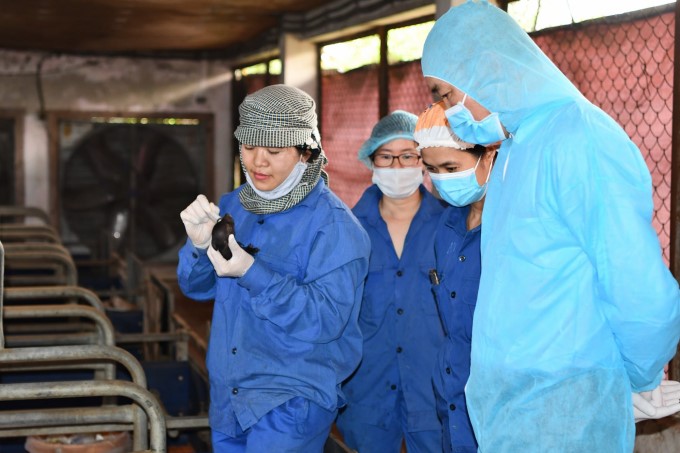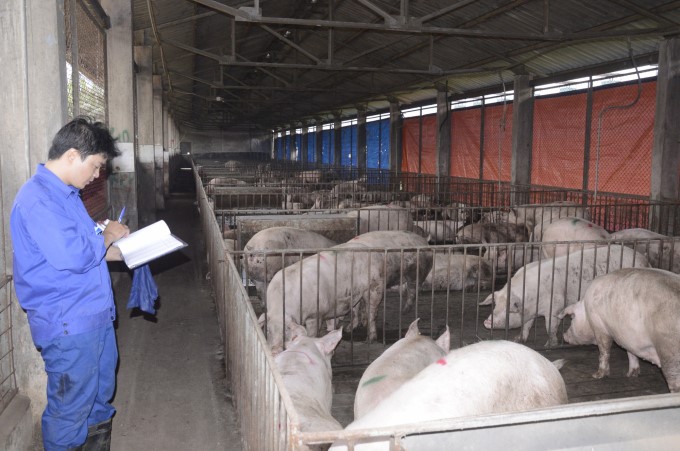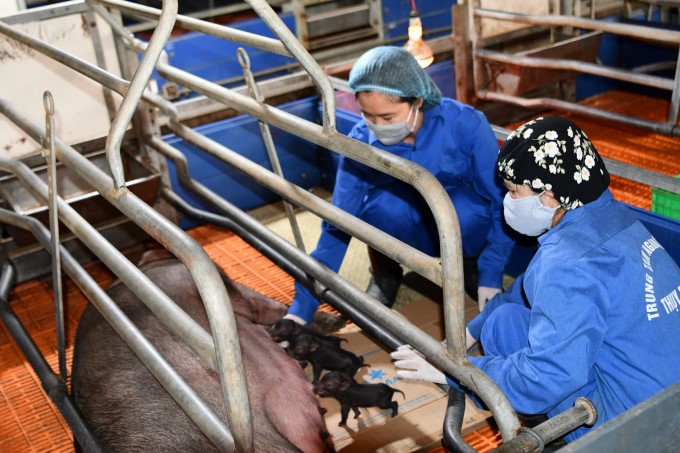June 21, 2025 | 02:35 GMT +7
June 21, 2025 | 02:35 GMT +7
Hotline: 0913.378.918
June 21, 2025 | 02:35 GMT +7
Hotline: 0913.378.918

Leaders of the Ministry of Agriculture and Rural Development checked cloned swine herds by the ear somatic method at the National Livestock Institute. Photo: VCN.
The past decade can be considered the decade of research about selecting and creating high-productivity pig lines. Starting from the super-reproductive genetic source of the VCN-MS15 pig line, the scientists have combined this pig line with some imported pigs such as Landrace, Yorkshire from Canada.
After 5 years of research from 2013 to 2017, the attained results are two synthetic pig lines TH12 and TH21, one last male line DC1 from the research of Thuy Phuong Pig Research Center (National Livestock Institute). Reproduction capability of the two synthetic lines TH12 and TH21 reaches a high level with the number of live births ≥ 13 children; the number of weaned children reaches ≥ 12 children; weight increase in the posterior period reaches ≥ 750g/day.
For the last male line DC1, the ability to increase weight in the period of yield test reaches ≥ 1000 g/day; feed consumption reaches ≤ 2.4 kg/weight gain kg; at the same time, the lean meat rate reaches ≥ 62%. Currently, the mentioned lines have been put into trial production on a farm scale.
In addition to using super-reproductive genetic resources to create synthetic lines for domestic production, scientists also use and utilize precious genetic resources of foreign pigs through breeds import programs and projects from Canada, France, America and Denmark, thereby creating their own lines bearing Vietnam’s brand, typically lines such as YVN, LVN and DVN.
Especially during this period, the studies were also recognized by the Ministry level Scientific Council as technical progress with the lines LRVCN-MS15, YVCN-MS15, VCN15 and VCN16. These are the main lines created to supply materials for breeding research to serve livestock farming on farm scale in Northern mountainous provinces.

Thanks to the effective application of breed genetics, the productivity and yield of pig herds in Vietnam at the moment are getting closer to the level of advanced countries in the world. Photo: Minh Phuc.
In recent years, Vietnamese scientists have successfully applied many modern software programs and breeding methods such as REML, BLUP, PIGBLUP, VCE, PEST, ASREML, WOMBAT, ZPLAN + ..., and since then they have chosen and created many lines and breeds of livestock with high productivity and product quality to meet the needs of production. Along with that, molecular genetic techniques are gradually being applied widely in pig breeding.
Initially, scientists have identified the effects of Halothane, RN, MC4, HFABF genes on pork performance, genes involved in reproductive performance such as RNF4, RBP4 and IGF2 in pigs.
The successful application of molecular genetic technology during this period helps to speed up genetic progress by shortening the time for the selection of traits of interest.

Taking care of sows at Thuy Phuong Pig Research Center. Photo: VCN.
In pig breeding, large hatcheries mainly apply phenotypic value selection, based on the selection index (SPI, MLI or SLI).
Some pig lines and breeds selected and bred according to traditional methods such as Y-VCN, L-VCN, D-VCN, Pi-VCN; VCN-01, VCN-02 ... which were selected by the National Livestock Institute has productivity equivalent to imported pig breeds of domestic and foreign companies (number of live births > 11 piglets, number of weaned piglets/drove is 10.5 piglets, the number of litters/sow/year is 2.2 - 2.3 litters).
In the coming time, our country's livestock industry will develop in the direction from width to depth, increase added value, efficiency and sustainability; meet domestic demand and boost exports; protect the ecological environment.
To achieve those goals, a profound strategy and solution are needed. In particular, it is necessary to continue implementing the national livestock breeding program to ensure continuity, focusing on the main breeds of pigs, in which the artificial insemination system needs to pay special attention to investment and state management.
/2025/06/17/3942-2-143243_548.jpg)
(VAN) Recently, in Sweden, the Secretary of the Binh Dinh Provincial Party Committee presented the Investment Registration Certificate for the 'Polyester Fabric Recycling Complex' project to SYRE Impact-AB Company.
/2025/06/12/3721-2-202745_83.jpg)
(VAN) TH made an impression at Seoul Food 2025 with its line of natural beverages, paving the way for Vietnamese food products to enter the South Korean market.

(VAN) Soc Trang's success in rice exports stems from a strategy of developing fragrant and specialty rice cultivation areas and standardizing production toward low-emission practices.
/2025/06/11/1311-5-120811_839.jpg)
(VAN) The pig farming industry is facing the challenge of comprehensive restructuring to meet requirements for quality, safety, traceability, and market expansion both domestically and for export.

(VAN) Vietnam considers participating in ALGROALBA in order to expand agricultural production, coordinate the assessment and effective exploitation potential land.
/2025/06/05/5314-1-184727_407.jpg)
(VAN) From seemingly worthless fish scales and skin, enzymes and lactic ferments can transform by-products into peptides, opening a sustainable, effective business direction and elevating Vietnamese seafood.

(VAN) TTC AgriS and IFC signed a strategic partnership to develop a sustainable agricultural value chain, aiming to achieve the Net Zero target by 2035.